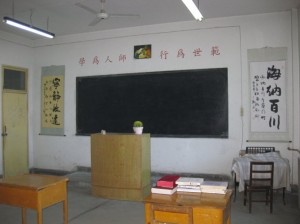Zhou Yong and He Shanyun finished the study about Chinese NGOs’ educational reform contributions in Dec., 2011. This study is one of the PERI research grants 2010 programs for delivering theoretical and empirical new researcher on the impact of NGO forces in the development of educational equity and social justice in China.
The key issues of this study are about the basic structure of the typical NGOs’ educational actions for social justice, as well as the structural defects and hidden difficulties in expanding the movements within complicated Chinese educational social contexts.
Zhou Yong is a professor of history of Chinese education. He Shanyun is a doctor candidate whose Ph.D. dissertation is to address the NGOs’ role inChina’s educational reform. Both are from East China Normal University(ECNU), Shanghai, China.
With the suggestions of our reviewers inNepalconference and our reconsiderations, we have realized that this study can provide the NGOs scholars and any relevant audience with interesting samples to think about contemporary Chinese intellectuals and professionals’ roles in advancingChina’s educational developments and social justice. We hope that this study will call for more supports to the overlooked Chinese NGOs’ which have been dedicating to improve the enterprises of educational social progress since the 1990s.
The following is the abstract of this study:
Chinese intellectuals and professionals as well as other private social forces once played leading roles in educational developments in Republican China. From 1949 to 1978, almost all the independent, progressive intellectuals and professionals had been transformed and assimilated by the radical socialist state power. However, since the new socialist state power led by Deng Xiaoping has implemented the policy of economical reform and opening, more and more intellectuals and professionals have formed the ideal of developing their own enterprises in the opening and reforming times.
To our perspective, the most significant the intellectuals and professionals’ role change in the 1990s was that Liang Congjie, Yang Dongping, as well as many other intellectuals and professionals not only dedicated themselves to the independent public good enterprises, but also invented the new private institutions of NGO to realize their environment protection and social justice oriented educational ideals. It was these intellectuals and professionals who initiated the NGOs’ educational movements for social justice in contemporaryChina.
In the recent ten years, there are more and more private NGOs dedicating to the course of educational equality. Seeing from the typical NGOs examined in this study, including the 21st Century Education Institute, the Cherished Dreams Foundation (CDF), the Teach Future China (TFC), and the Bai Nian Vocational School (BNVS), the basic structure of the educational movements for social justice is at least weaved by four kinds of action models: 1)Participating in educational policy making and innovations for educational equality and progress; 2)Providing the poor with good educational service and products; 3)Selecting and training university students to teach 2 years for the poor; 4)Establishing good schools for the city peasant labor children. With these four action models, the NGOs sponsored by the intellectuals and professionals have launched numerous justice oriented educational reform programs all over the country, and played a significant role in reducing the social educational gap through providing the poor with sound policy and practical supports.
However, it must be pointed out that, inChina, the state is the highest leader of the educational movements for social justice with which the NGOs have deeply involved. No matter what kinds of developments the NGOs can make, they can hardly become the western like “civil society” within Chinese political system, but become relatively more independent and functional as the state governed participants in the state led educational movements for social justice.
The NGOs are well informed about the large and pressing educational demanding of the inferior social groups. Thus they are all dreaming of further expanding their justice oriented educational enterprises. However, with regard to the dream of expansion, the NGOs are facing at least two kinds of big challenges. The first one is caused by the NGOs’ clear interior financial and institutional shortcomings, as well as the outside state’s rigorous governing systems over the NGOs. The second kind of challenges is coming from the test driven school pedagogies, as well as the mass’s educational values, and their ignorance of, or low understanding about NGO which is even more difficult to define and change within short periods.
Despite facing severe challenges and difficulties, Xu Yongguang, Yang Dongping, Yao Li and other NGO sponsors have made decision to persistent to the end since they stepped into the course of educational equality and social justice. The expansion of the NGO’s educational movements for social justice depends largely on whether the NGOs, the state, and the society can improve the existed rigorous or alienated relations with the spirits of real trust and cooperation

